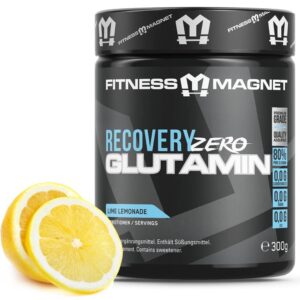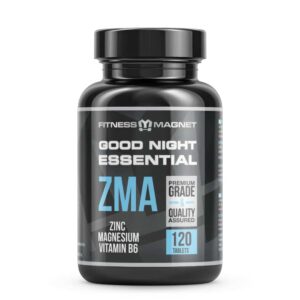Wer schwer trainiert, muss auf eine ausreichende Proteinversorgung achten. Soweit so klar. Allerdings haben für unseren Körper nicht alle Aminosäuren die gleiche Bedeutung, da sie jeweils unterschiedliche Aufgaben übernehmen. Dementsprechend wollen wir uns im Rahmen dieses Artikels der Aminosäure L-Glutamin widmen, die für uns Kraftsportler eine ganz besondere Rolle spielt. Aber welche Funktionen erfüllt sie und wo liegen die spezifischen Vorteile, die eine Supplementierung rechtfertigen?
Was ist Glutamin?
Bei L-Glutamin handelt es sich um eine proteinogene Aminosäure, die allerdings nicht zu den essentiellen, dafür aber zu den semi-essentiellen Aminosäuren, gehört. Auch wenn das bedeutet, dass unser Organismus Glutamin in Eigenregie aus anderen Aminosäuren herstellen kann, heißt das noch lange nicht, dass sie für uns weniger wichtig wäre. Ganz im Gegenteil, denn wie wichtig sie tatsächlich ist, wird bereits dadurch unterstrichen, dass sie mit einem Mengenanteil von rund 20 Prozent der Hauptbestandteil der freien Aminosäuren in unserem Blutplasma ausmacht. Der semi-essentielle Charakter des Glutamins ist dafür verantwortlich, dass diese Aminosäure trotz der körpereigenen Glutaminsynthese über die Nahrung zugeführt werden muss. Das ist vor allem bei intensiv trainierenden Sportlern der Fall, da die körpereigene Synthese in solchen Fällen nicht mehr mit der Produktion nachkommt. Die Bildung selbst geschieht dabei größtenteils in der Skelettmuskulatur, wobei sowohl Glutaminsäure als auch Glutamat benötigt werden.
Welche Funktionen erfüllt Glutamin im Körper?
Warum das Glutamin in einer so massiven Konzentration in unserem Blut vorhanden ist, wird klar, wenn wir uns die Funktionen der Aminosäure anschauen. Glutamin ist nämlich für den Aufbau von Muskeleiweißen unersetzlich, die für die Reparatur und die Neubildung von Muskelgewebe benötigt werden. Dabei dient es beispielsweise als Substrat während dem Spannungsaufbau in der Muskulatur. Darüber hinaus ist die Aminosäure dafür verantwortlich, dass die Muskulatur mit Nährstoffen und Substraten wie Kreatin, Wasser und Kohlenhydraten versorgt wird. Zudem wirkt sich die Aminosäure nicht nur indirekt, sondern auch direkt auf den Muskelaufbau aus, indem es die Oxidation der zu den BCAAs zählenden Aminosäure L-Leucin bremst. Das wiederum führt zu einer effizienteren Verstoffwechslung des Leucins, das im Rahmen der Proteinsynthese ein entscheidender Initiator für das Muskelwachstum ist. Diesen Effekt konnten Forscher der University of Illinois im Jahr 2006 bestätigen. Nicht minder wichtig ist der positive Einfluss der Glutaminkonzentration auf die Stickstoffbilanz, die wiederum ihrerseits die Grundlage für den Muskelaufbau ist. Auch ist Glutamin laut einer im International Journal of Sports Medicine dazu in der Lage katabolen Stoffwechselprozessen entgegenzuwirken, da es die negativen Effektive des Stresshormons Cortisol abmildert.
Glutamin stärkt das Immunsystem
In zahlreichen Studien hat man bereits beobachtet, dass die körpereigene Produktion zum Beispiel während Krankheiten deutlich abnimmt. In der Folge beobachtete man ebenfalls ein Absinken der Glutaminkonzentration im Blutplasma und in der Muskulatur. Im Umkehrschluss kam man zu der Erkenntnis, dass eine gezielte Glutaminzufuhr das Immunsystem stärkt. Diese Schlussfolgerung lässt sich unter anderem darauf zurückführen, dass unsere Immunzellen, die Makrophagen und Lymphozyten vorrangig Glutamin als Substrat nutzen. Sinkt also die Glutaminkonzentration im Organismus verringert sich auch die Energieversorgung unseres Abwehrsystems. Hinzu kommt der Einfluss von der Aminosäure auf ein ausgeglichenes Verhältnis von Säuren und Basen in unseren Nieren, wodurch unsere Giftfilter deutlich effektiver und zuverlässiger arbeiten können.
Warum ist die Aminosäure für uns Kraftsportler so wertvoll?
Da intensives Krafttraining einen ähnlich negativen Einfluss auf die Glutaminkonzentration in unserem Organismus hat, liegt es auf der Hand, dass diese Aminosäure für uns Kraftsportler und für Sportler generell besonders wertvoll ist. Wie bedeutend, das belegt eine Untersuchung der Oxford University, die nach intensivem Training einen Abfall des Glutaminspiegels um bis zu 30 Prozent nachweisen konnte. Darüber hinaus dauert es laut den Forschern mehrere Tage, bis die ursprüngliche Glutaminkonzentration wieder erreicht ist. Da wir wissen, wie entscheidend die Aminosäure an der Proteinsynthese und damit am Muskelaufbau beteiligt ist, lässt sich leicht darauf schließen, dass ein verringerter Glutaminspiegel den Muskelaufbau bremst. Hinzu kommt, dass der Organismus die Aminosäure bevorzugt für die Energieversorgung der Immunabwehr einsetzt, da diese selbstredend wichtiger ist als der Muskelaufbau.
Kann es zu einem Glutaminmangel kommen?
Im Angesicht der Wichtigkeit des Glutamins kommen wir nahtlos zu der Frage, ob ein Glutaminmangel möglich ist und wie sich dieser äußert. In der Regel ist ein Glutaminmangel bei einem Durchschnittsmenschen, der sich ausgewogenen ernährt und keinen außerordentlichen Belastungen ausgesetzt ist, sehr unwahrscheinlich. Wie bereits angesprochen führen intensive Belastungen, wie zum Beispiel durch Sport, zu einem deutlich erhöhten Bedarf. Wird dieser nicht gedeckt äußerst sich der Glutaminmangel aber nicht nur anhand einer Drosselung des Muskelaufbaus, sondern auch an einer erhöhten Anfälligkeit für Infektionen. Gerade für Sportler sind diese natürlich besonders ärgerlich, da die damit verbundenen Zwangspausen die Arbeit von Wochen zerstören können. Ein Glutaminmangel tritt aufgrund der starken Reduktion der Nahrungsmittelzufuhr besonders häufig auch im Rahmen von Diäten auf. Eine exakte Definition von Glutaminmangel gibt es allerdings nicht, sodass du prinzipiell darauf achten solltest, eher mehr als zu wenig aufzunehmen. Diese Regel gilt, wenn du intensiv trainierst, vor allem aber, wenn du schwer trainierst und gleichzeitig eine Diät durchziehst.
Wie und in welcher Form kann ich die Aminosäure einnehmen?
Die gebräuchlichste Form, in der die Aminosäure als Nahrungsergänzungsmittel erhältlich ist, ist in Pulverform. Alternativ bieten sich auch genormte Kapseln und Pillen an, welche die Dosierung deutlich erleichtern. Alternativ kannst du natürlich auch zu besonders glutaminreichen Lebensmitteln greifen. Dazu zählen unter anderem Weizen, Mais, Linsen und Milchprodukte. Auch Casein Protein selbst ist sehr glutaminreich. Unabhängig davon, für welche Darreichungsform du dich letztendlich entscheidest, empfiehlt es sich, Glutaminpräparate nach Möglichkeit unmittelbar vor dem Zubettgehen einzunehmen, da so über Nacht die Regeneration gefördert und der Muskelaufbau angekurbelt wird. Darüber hinaus ist an Trainingstagen auch die Einnahme direkt nach dem Training sehr empfehlenswert. Insgesamt haben Studien erweisen, dass je nach Intensität der körperlichen Belastung 20-30 Gramm pro Tag ausreichend sind. Während sich Frauen eher am unteren Empfehlungsbereich orientieren, können Männer die Aminosäure durchaus im Bereich des oberen Limits dosieren.
Sind bei der Einnahme Nebenwirkungen zu erwarten?
Wie bei jedem Nahrungsergänzungsmittel stellt sich natürlich auch an dieser Stelle die Frage danach, ob eine Überdosierung möglich ist und welche Nebenwirkungen im Eventualfall zu erwarten sind. Glücklicherweise können wir es kurz machen, denn Nebenwirkungen, wie sie klassischerweise bei Medikamenten oder Stimulanzien auftreten können, brauchst du bei der Einnahme nicht zu befürchten. Dies liegt daran, dass dein Körper sehr effizient darin ist, Nährstoffe zu verwerten. Wie beim Konsum von Proteinen kann es vereinzelt allerdings zu Blähungen und leichten Durchfällen kommen. Lediglich Personen, die an Epilepsie leiden, sollten vor der zusätzlichen Einnahme von Glutaminpräparaten Rücksprache mit einem Arzt halten, da die Aminosäure die Symptome in seltenen Fällen verstärken kann.

